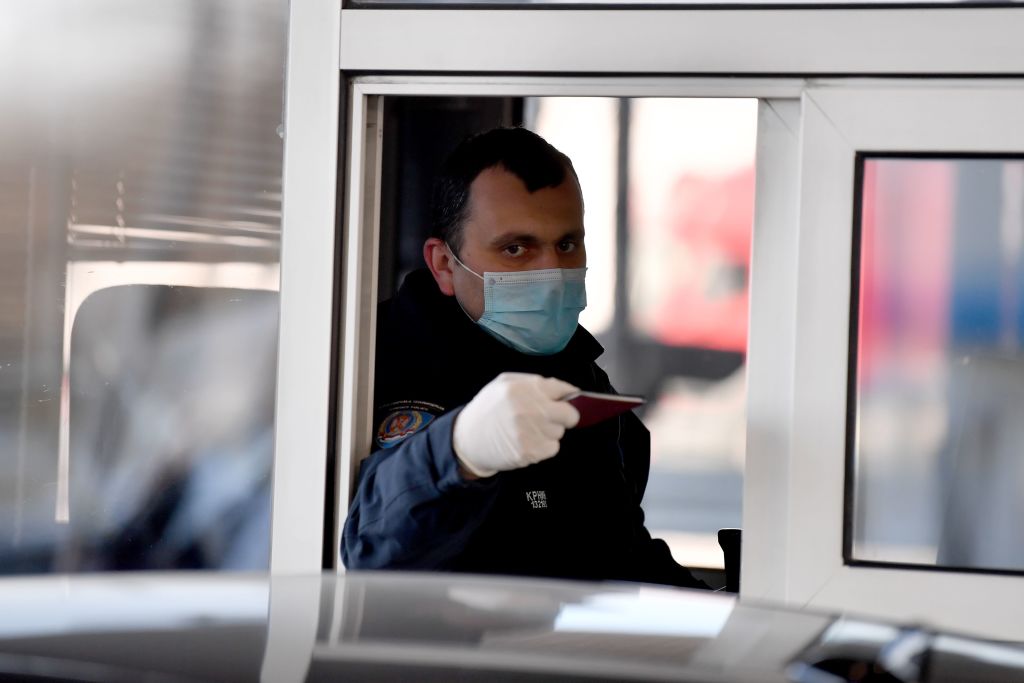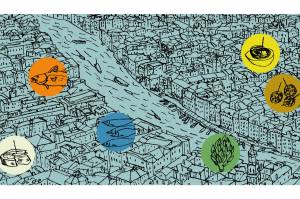What with the wall-to-wall media coverage of the coronavirus pandemic it had rather slipped one’s mind that there are other serious issues confronting Europe, but France got a bloody reminder at the weekend.
On Saturday, a knifeman ran amok in the south-eastern town of Romans-sur-Isere, killing two people and wounding five. According to eyewitnesses, the alleged perpetrator, a Sudanese national who was granted asylum in 2017, accompanied his deadly assault outside a boulangerie with cries of ‘Allahu Akbar’. It is claimed in the French media that when police searched his apartment they found handwritten documents in which he complained of living in ‘a country of non-believers’. Two other Sudanese refugees are being questioned by police, one of whom has reportedly told them that the attacker had ‘resented’ the rules of the lockdown.
Macron’s political opponents lost no time in expressing their outrage at this latest atrocity. The center-right Les Republicains MP, Eric Ciotti, tweeted a photo of one of the victims, who was killed protecting his 12-year-old son. He said that once more France was paying the price for its naive open borders policy.
Marine Le Pen, leader of the right-wing National Rally, tweeted a similar message and also published an open letter she has written to Christophe Castaner, minister of the interior, in which she demanded immediate action against what she claims are the growing number of mosques in France using loudspeakers to call the faithful to prayer, clips of which her party have uploaded onto social media. ‘We’re witnessing a new escalation in the illegal occupation of the public domain by means of sound, by groups who are looking to seize every occasion to push back against the Republic’s principles of secularism, and therefore are openly defying the State,’ said Le Pen.
Her use of the word ‘occupation’ was Le Pen’s own provocation; in 2015, she was acquitted of hate speech in a Lyon court having five years earlier likened Muslims praying in French streets to the Germans’ war-time ‘occupation’ of the country.
The attack at the weekend, and the fact that the alleged assailant was a refugee, is likely to focus minds in every government in Europe. Europe is on the cusp of a catastrophic recession and millions will probably lose their jobs. There will be hardship and anger on a scale not seen since the great depression of the 1930s. Scapegoats will inevitably be sought.
No country has been affected by coronavirus more than Italy. And as CNN reported at the weekend, ‘there’s trouble brewing down south’, with accounts of penniless Sicilians so desperate for food they are ransacking supermarkets. Roberto Gualtieri, Italy’s finance minister, has stated that the country’s gross domestic product will fall by six percent this year, although some economists predict it will be more. And this morning, his French counterpart, Bruno Le Maire, announced that the country is heading into its worst recession since 1945.
Yet as the Guardian explained on Saturday, despite the economic disaster unfolding in Europe, an NGO rescue vessel has taken to the waters of the Mediterranean, and is expected to reach the seas off Libya this weekend. The ship is operated by a German humanitarian organization, whose mission manager, Jan Ribbeck, remarked: ‘This pandemic will be over at some point but migration will not.’
Despite the lack of NGO vessels in the Mediterranean last month, 800 migrants still attempted to cross into Europe, nearly 200 of whom were successful. Forty three landed in the Sicilian island of Lampedusa. There is already little goodwill in Italy towards Germany for what they perceive as their neighbor’s cold-hearted attitude during the pandemic. News that a German-operated vessel is the first to resume rescue missions in the Med is likely to increase tensions.
You suspect that Italians, as well as the Spanish and French, who for weeks have been imprisoned in their own homes might not take kindly to the disclosure that migrants may soon start arriving on their shores. In late February, locals on the Greek islands of Lesbos and Chios staged violent protests against the arrival of migrants from Turkey. Such scenes could become commonplace this summer across Europe in the present climate of fear and anger.
Humanitarian organizations must understand that the world is undergoing an unprecedented transformation, particularly in Europe where tens of thousands have already died from coronavirus as overstretched health services struggle to cope and economies are left on their knees. The continent is in the process of being reshaped and while Jeremy Corbyn may believe a new socialist dawn is on the horizon he would do well to temper his enthusiasm. Economically Europe may move to the left, but socially, the direction will be to the right. The era of open borders and mass immigration is over, at least for now, and the sooner the EU grasps this fact, the better.
If they don’t, then the future will belong to Matteo Salvini and Marine Le Pen and the AfD, and do they really want that?
This article was originally published onThe Spectator’s UK website.


















